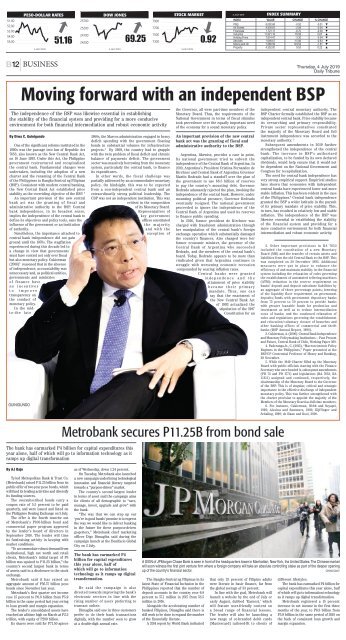04 JULY 2019
Create successful ePaper yourself
Turn your PDF publications into a flip-book with our unique Google optimized e-Paper software.
51.00<br />
52.00<br />
53.00<br />
54.00<br />
55.00<br />
PESO-DOLLAR RATES<br />
3 <strong>JULY</strong> <strong>2019</strong><br />
51.16<br />
25700<br />
25200<br />
24700<br />
24200<br />
DOW JONES<br />
3 <strong>JULY</strong> <strong>2019</strong><br />
69.25<br />
7900<br />
7700<br />
STOCK MARKET<br />
7500<br />
7300 0.92<br />
3 <strong>JULY</strong> <strong>2019</strong><br />
3 <strong>JULY</strong> <strong>2019</strong><br />
INDEX SUMMARY<br />
INDEX VALUE CHANGE % CHANGE<br />
PSEi 8,092.68 -0.92 -0.01 ▼<br />
All Shares 4,939.63 -2.08 -0.<strong>04</strong> ▼<br />
Financials 1,721.11 -6.70 -0.39 ▼<br />
Industrial 11,921.16 79.09 0.67 ▲<br />
Holding Firms 7,814.47 -3.30 -0.<strong>04</strong> ▼<br />
Services 1,698.67 -15.86 -0.93 ▼<br />
Mining and Oil 7,566.59 123.54 -1.61 ▼<br />
Property 4,352.00 9.53 0.22 ▲<br />
B12 BUSINESS<br />
Thursday, 4 July <strong>2019</strong><br />
Daily Tribune<br />
Moving forward with an independent BSP<br />
The independence of the BSP was likewise essential in establishing<br />
the stability of the financial system and providing for a more conducive<br />
environment for both financial intermediation and robust economic activity<br />
By Diwa C. Guinigundo<br />
One of the significant reforms instituted in the<br />
1990s was the passage into law of Republic Act<br />
7653, also known as the New Central Bank Act,<br />
on 10 June 1993. Under this Act, the Philippine<br />
government restructured and recapitalized<br />
the central bank. Fundamental changes were<br />
undertaken, including the adoption of a new<br />
charter and the renaming of the Central Bank<br />
of the Philippines to Bangko Sentral ng Pilipinas<br />
(BSP). Consistent with modern central banking,<br />
the New Central Bank Act established price<br />
stability as the overriding objective of the BSP. 2<br />
An important provision of the new central<br />
bank act was the granting of fiscal and<br />
administrative authority to the BSP. Central<br />
bank independence, in its broadest sense,<br />
implies the independence of the central bank to<br />
define its objectives and policy tools, sans the<br />
influence of the government or an institution<br />
of authority.<br />
Nonetheless, the importance attached to<br />
central bank independence did not gain<br />
ground until the 1970s. The stagflation<br />
experienced during this decade led to<br />
a change in view that governments<br />
must have control not only over fiscal<br />
but also monetary policy. Cukierman<br />
(2006) 3 reasoned that in the absence<br />
of independence, accountability was<br />
unnecessary and, as political entities,<br />
governments and ministries<br />
of finance have<br />
no incentives<br />
to improve<br />
transparency on<br />
the conduct of<br />
monetary policy.<br />
In the midto-the<br />
late<br />
GUINIGUNDO<br />
1960s, the Marcos administration engaged in heavy<br />
deficit spending with the government floating<br />
bonds in substantial volumes for infrastructure<br />
projects. 4 By 1969, the country had to grapple<br />
with the twin problem of fiscal deficit and chronic<br />
balance of payments deficit. The government<br />
sector was massively borrowing from the monetary<br />
system, particularly the central bank, to finance<br />
its expenditures.<br />
In other words, the fiscal challenge was<br />
partially addressed by an accommodative monetary<br />
policy. On hindsight, this was to be expected<br />
from a non-independent central bank and an<br />
extraordinarily strong political leadership. The<br />
CBP was not an independent institution. This was<br />
evident in the composition<br />
of its Monetary Board.<br />
Representatives of<br />
key government<br />
offices constituted<br />
the majority<br />
and with the<br />
exception of<br />
the Governor, all were part-time members of the<br />
Monetary Board. Thus, the requirements of the<br />
National Government in terms of fiscal stimulus<br />
took precedence over the equally important need<br />
of the economy for a sound monetary policy.<br />
An important provision of the new central<br />
bank act was the granting of fiscal and<br />
administrative authority to the BSP.<br />
Argentina, likewise, provides a case in point.<br />
Its national government tried to subvert the<br />
independence of the Central Bank of Argentina. In<br />
2010, Argentina’s President Cristina Fernandez de<br />
Kirchner and Central Bank of Argentina Governor<br />
Martin Redrado had a standoff over the plan of<br />
the government to use $6.5 billion of reserves<br />
to pay the country’s mounting debt. Governor<br />
Redrado adamantly rejected the plan, invoking the<br />
independence of the central bank. However, under<br />
mounting political pressure, Governor Redrado<br />
eventually resigned. The national government<br />
proceeded to ignore the independence of the<br />
Central Bank of Argentina and used its reserves<br />
to finance public spending.<br />
In 2016, former president de Kirchner was<br />
charged with fraudulent administration through<br />
her manipulation of the central bank’s foreign<br />
exchange operation which substantially damaged<br />
the country’s finances. Also charged were her<br />
former economic minister, the governor of the<br />
Central Bank of Argentina who succeeded<br />
Redrado, and the members of the central bank’s<br />
board. Today, Redrado appears to be more than<br />
vindicated given that Argentina continues to<br />
struggle with worsening economic recession<br />
compounded by soaring inflation rates.<br />
Central banks were granted<br />
independence and the<br />
attainment of price stability<br />
became their primary<br />
mandate. Thus, one can<br />
say that the enactment of<br />
the New Central Bank Act<br />
of 1993 actualized the<br />
stipulation of the 1987<br />
Constitution for an<br />
independent central monetary authority. The<br />
BSP Charter formally established the BSP as an<br />
independent central bank. Price stability became<br />
its overarching and primary responsibility.<br />
Private sector representatives constituted<br />
the majority of the Monetary Board and full<br />
instrument independence was accorded to the<br />
monetary authority. 5<br />
Subsequent amendments in <strong>2019</strong> further<br />
strengthened the independence of the central<br />
bank. The increase in BSP’s authorized<br />
capitalization, to be funded by its own declared<br />
dividends, would help ensure that it would not<br />
be dependent on the National Government and<br />
Congress for recapitalization.<br />
The need for central bank independence has<br />
very strong empirical support. Empirical studies<br />
have shown that economies with independent<br />
central banks have experienced lower and more<br />
stable inflation. This has been evident in the case<br />
of the Philippines. 6 Central bank independence<br />
granted the BSP a wider latitude in the pursuit<br />
of its primary mandate of price stability. This,<br />
in turn, has resulted in relatively low and stable<br />
inflation. The independence of the BSP was<br />
likewise essential in establishing the stability<br />
of the financial system and providing for a<br />
more conducive environment for both financial<br />
intermediation and robust economic activity.<br />
2. Other important provisions in RA 7653<br />
included the constitution of a new Monetary<br />
Board (MB) and the transfer of certain assets and<br />
liabilities from the old Central Bank to the BSP. This<br />
was completed on 20 December 1993. Additional<br />
measures were put in place to enhance the<br />
efficiency of and maintain stability in the financial<br />
system including the relaxation of rules governing<br />
the establishment of automated tellering machines<br />
(ATM); reduction in the reserve requirement on<br />
banks’ deposit and deposit substitute liabilities by<br />
an aggregate of three percentage points; lowering<br />
of the liquidity floor requirement on government<br />
deposits/funds with government depository banks<br />
from 75 percent to 50 percent to provide banks<br />
with greater loanable funds for production and<br />
investment as well as to reduce intermediation<br />
costs of banks; and the continued relaxation of<br />
rules and regulations governing the establishment<br />
and relocation/voluntary closure of branches and<br />
other banking offices of commercial and thrift<br />
banks (BSP Annual Report, 1993).<br />
3. Cukierman, A. (2006). Central Bank Independence<br />
and Monetary Policymaking Institutions — Past Present<br />
and Future, Central Bank of Chile, Working Paper 360.<br />
4. Paderanga Jr., C. (2013), “Macroeconomic Policy<br />
Regimes in the Philippines,” Paper presented at the<br />
BSP-UP Centennial Professor of Money and Banking,<br />
29 November.<br />
5. While the 1949 Charter filled up the Monetary<br />
Board with public officials starting with the Finance<br />
Secretary who once headed it, subsequent amendments<br />
(PD 72 and PD 1771) and legislations (RA 7653, RA<br />
11211) assigned and continued, respectively, the<br />
chairmanship of the Monetary Board to the Governor<br />
of the BSP. This is of singular, critical and strategic<br />
importance to the effective discharge of independent<br />
monetary policy. This was further strengthened with<br />
the charter provision to appoint the majority of the<br />
Members of the Monetary Board as full-time members.<br />
6. For instance, Cukierman, Webb and Neyapti,<br />
1992; Alesina and Summers, 1993; Eijffinger and<br />
Schaling, 1998; de Haan and Kooi, 2000.<br />
Metrobank secures P11.25B from bond sale<br />
The bank has earmarked P4 billion for capital expenditures this<br />
year alone, half of which will go to information technology as it<br />
ramps up digital transformation<br />
By AJ Bajo<br />
Ty-led Metropolitan Bank & Trust Co.<br />
(Metrobank) raised P11.25 billion from its<br />
public offer of two-year peso bonds, which<br />
will fund its lending activities and diversify<br />
its funding sources.<br />
The oversubscribed bonds carry a<br />
coupon rate of 5.5 percent to be paid<br />
quarterly, and were issued and listed on<br />
the Philippine Dealing Exchange on 3 July.<br />
The offer is the fourth tranche out<br />
of Metrobank’s P100-billion bond and<br />
commercial paper program approved<br />
by the lender’s board of directors in<br />
September 2018. The lender will time<br />
its fund-raising activity in keeping with<br />
market conditions.<br />
“To accommodate robust demand from<br />
institutional, high net worth and retail<br />
clients, Metrobank’s initial target of P5<br />
billion was upsized to P11.25 billion,” the<br />
country’s second largest bank in terms<br />
of assets said in a disclosure to the stock<br />
exchange.<br />
Metrobank said it has raised an<br />
aggregate amount of P56.75 billion peso<br />
bonds since November last year.<br />
Metrobank’s first quarter net income<br />
rose 15 percent to P6.8 billion from P5.9<br />
billion in the same period last year owing<br />
to loan growth and margin expansion.<br />
The lender’s consolidated assets have<br />
reached an all-time high on March at P2.3<br />
trillion, with equity of P289 billion.<br />
Its shares were sold for P71.50 apiece<br />
as of Wednesday, down 1.24 percent.<br />
On Tuesday, Metrobank also launched<br />
a new campaign underlining technological<br />
innovation and financial literacy targeted<br />
towards a “purpose-driven” market.<br />
The country’s second largest lender<br />
in terms of asset said the campaign aims<br />
for clients of all demographic to “save,<br />
manage, invest, upgrade and grow” with<br />
the bank.<br />
“The way that we can step up our<br />
‘you’re in good hands’ promise is to express<br />
the way we would like to deliver banking<br />
in the future for these purpose-driven<br />
go-getters,” Metrobank chief marketing<br />
officer Digs Dimagiba said during the<br />
campaign launch at the Bonifacio Global<br />
City on 2 July.<br />
The bank has earmarked P4<br />
billion for capital expenditures<br />
this year alone, half of<br />
which will go to information<br />
technology as it ramps up digital<br />
transformation.<br />
He said the campaign is also<br />
directed towards improving the bank’s<br />
electronic services in line with the<br />
rising number of users preferring to<br />
transact online.<br />
Dimagiba said one in three customers<br />
prefer to do their bank transactions<br />
digitally, with the number seen to grow<br />
at a double-digit annual rate.<br />
A SIGN of JPMorgan Chase Bank is seen in front of the headquarters tower in Manhattan, New York, the United States. The Chinese market<br />
will soon witness the first joint venture firm where a foreign company will take an absolute controlling stake as part of the deeper opening<br />
up of the country's financial sector.<br />
CHINA DAILY<br />
The Bangko Sentral ng Pilipinas in its<br />
latest State of Financial Inclusion in the<br />
Philippines reported that the number of<br />
deposit accounts in the country rose 6.8<br />
percent to 57.1 million in 2017 from 53.5<br />
million in 2016.<br />
Alongside the accelerating number of<br />
banked Filipinos, Dimagiba said there is<br />
still work to be done to expand the number<br />
of the financially literate.<br />
A 2014 report by World Bank indicated<br />
that only 25 percent of Filipino adults<br />
were literate in basic finance, far from<br />
the global average of 33 percent.<br />
In line with the goal, Metrobank will<br />
launch a website by the end of July or<br />
early August, dubbed ‘Earnest,’ which<br />
will feature user-friendly content on<br />
a broad range of financial lessons.<br />
The lender will also be launching a<br />
new range of co-branded debit cards<br />
(Mastercard) tailored-fit to clients of<br />
different lifestyles.<br />
The bank has earmarked P4 billion for<br />
capital expenditures this year alone, half<br />
of which will go to information technology<br />
as it ramps up digital transformation.<br />
Metrobank registered a 15 percent<br />
increase in net income in the first three<br />
months of the year, to P6.8 billion from<br />
P5.9 billion in the same period of 2018 on<br />
the back of consistent loan growth and<br />
margin expansion.


















